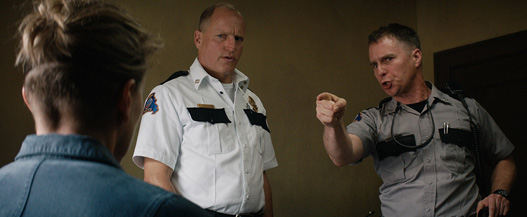|
|
Movie Review: Three Billboards Outside Ebbing, MissouriBy Matthew HuntleyDecember 7, 2017
Two of the officers Mildred specifically targets are Chief Willoughby (Woody Harrelson) and his second-in-command, Jason Dixon (Sam Rockwell), the former because he's the head of the department and should be a more capable leader, and the latter because he's a known drunk and racist. Willoughby, a family man and respected member of the community, tells her there was no DNA evidence to make an arrest for her daughter's rape and murder, and pleads with Mildred to take the posters down. But it goes to show just how relentless Mildred is when she pays Willoughby no attention and instead suggests he make a database cataloguing the DNA of every male over the age of eight living in Ebbing (despite the civil rights violation) and start looking for matches. Clearly, Mildred has thought this through, and she's not about to back down. The slow-witted, mamma's boy Dixon, meanwhile, thinks the police have the authority to take the posters taken down themselves since it's defamation of character, but one of the desk sergeants (Zeljko Ivanek) points out, “It's not defamation because she's asking a question.” Whether Mildred's question finds an answer, leads to an arrest, or just causes her more grief remains to be seen, but it certainly shakes up the town. All this sets the stage for Martin McDonagh's peculiar and offbeat “Three Billboards Outside Ebbing, Missouri,” which is technically a drama but also has moderate doses of comedy and violence. This is the type of off-kilter story McDonagh (“In Bruges”, “Seven Psychopaths”) is used to telling, and his earlier works proved the filmmaker's varying tones could make for stirring and rousing cinema, but with “Three Billboards,” he seems to have diluted his ambitions somewhat because the film often succumbs to incredulous contrivances just to get a rise out of us. As attention-holding as it is, thanks mostly to the strong performances, there's something off, perhaps even fraudulent, about the way the story plays out, and some of the events within McDonagh's screenplay are so far out there and unbelievable, the film as a whole isn't able to render the harrowing emotional or intellectual impact it wants.
|

|
|
|

|
Friday, November 1, 2024
© 2024 Box Office Prophets, a division of One Of Us, Inc.


